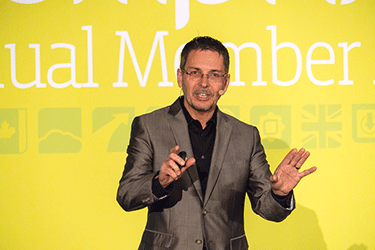 Tom Wujec, Autodesk fellow, TED speaker, author and Singularity University professor hit the stage for the breakfast keynote today at CompTIA’s Annual Member Meeting at the Swissotel in Chicago, held March 20 to 23, framing his remarks around three questions: How is tech changing? How is it affecting industries? And how is it affecting our ability to come up with creative solutions?
Tom Wujec, Autodesk fellow, TED speaker, author and Singularity University professor hit the stage for the breakfast keynote today at CompTIA’s Annual Member Meeting at the Swissotel in Chicago, held March 20 to 23, framing his remarks around three questions: How is tech changing? How is it affecting industries? And how is it affecting our ability to come up with creative solutions?
Speaking of Autodesk, Wujec explained the company quite simply, saying, “Our tools are made for people who make things,” as people working in an impressive array of industries – from manufacturing to entertainment – flashed on the screen behind him. Wujec then shared an eye-opening statistic; we will produce more transistors on Earth this year than grains of rice – they’re now just that small. Wujec also demonstrated the ubiquity of smart phones by showing a picture of a crowd holding a sea of them aloft at a concert. Smart phones, Wujec stated, have as much computational power as all of NASA had in 1969 – a staggering fact.
All of this allows humanity to capture, compute and create, Wujec explained. “Those of us who capitalize on it are taking great advantage of it,” he said. This, he said, means adopting to new technologies; especially in the world of entertainment consumption. “No one is going to build a VCR player that rewinds faster than any other,” he joked, adding that Netflix streaming now makes up 37 percent of Internet traffic. Wujec also cited the revolutionary effect Uber has had on taxis and socialization, and showed a video to demonstrate how startling riding in a self-driving car can be, even though it’s anticipated they’ll have a similar effect on all forms of transportation. Wujec asked the audience if anyone in it had even been in a self-driving car; at this point no one had.
Wujec’s overall point was that people adapt to technology changes faster these days. He pulled up a graph showing that even seemingly basic tools like radio and the telephone were adapted somewhat slowly, while in the 21st century humanity seizes on opportunities to innovate.
One particularly interesting example Wujec shared was a Rembrandt painting generated by a computer programmed to imitate the painter’s technique. “You wonder what Rembrandt the real person would say if he saw this,” he said. “It is of his hand, but he didn’t create it.”

